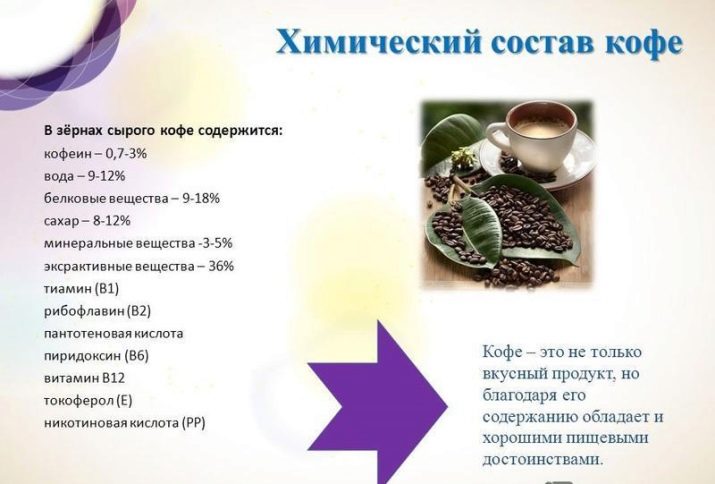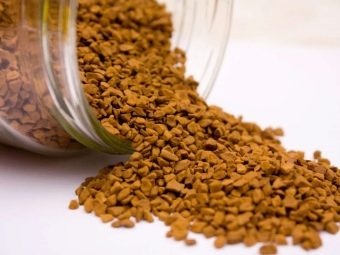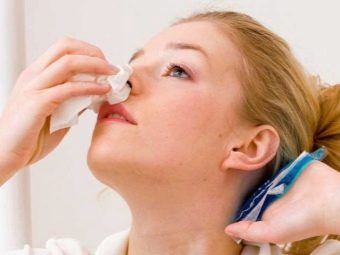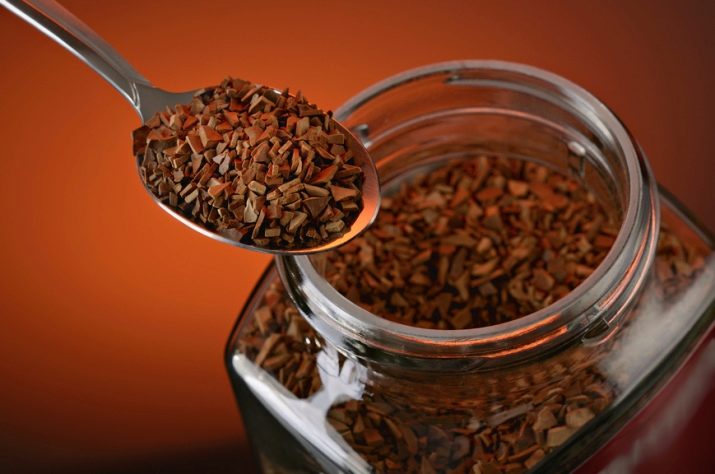Does coffee increase or decrease pressure?

Most people drink a cup of aromatic coffee after waking to cheer up before the start of a hard working day. Few people think about the influence of the drink on the functional activity of the cardiovascular system. At the heart of the drink is caffeine, which is able to increase blood pressure, judging by urban myths. On the other hand, there are comments from experts about a possible decrease in blood pressure. With age, the problem becomes more urgent, so you need to accurately understand, increases or lowers the pressure of freshly brewed coffee.
Chemical composition
Coffee beans contain more than a thousand chemical compounds that give certain types of coffee an individual aroma and taste. 75% of the basic composition is sparingly soluble polysaccharides, which are poorly absorbed into the intestine and are not amenable to disintegration in the digestive process. The rest of the coffee beans are fatty oils, water, and fiber. Also in the composition of the coffee beans include the following elements.
- Caffeine It is an alkaloid with a complex structure that does not have color and smell. In addition to coffee beans, this substance is present in cocoa beans, tea leaves and in the coca plant. I. V. Pavlov first discovered that caffeine can affect the cerebral cortex and cause excitation of the central nervous system. Thanks to this substance, the exacerbation of unconditioned reflexes occurs, cognitive functions and psychomotor reactions increase. With regular intake of caffeine passes chronic fatigue. But it is important to remember that a high concentration of a substance can cause exhaustion and dependence, and in rare cases intoxication of the organism develops. The concentration of caffeine depends on the culture of coffee beans: arabica contains up to 1.25%, in Liberia coffee - up to 1.55%, in Robusta - about 3%.
- Tannins - These are chemical elements that are responsible for the bitter taste of coffee. When roasting, the ratio of these substances changes.
- Chlorogenic acid found only in raw coffee beans. When used, the organic compound has a positive effect on the overall metabolism and stimulates the breakdown of lipids. It is a natural antioxidant. As a result of heat treatment, about 80% of this compound is decomposed.
- Flavonoids - chemical components that strengthen the vascular walls and increase their elasticity. Their other name is a group of vitamins P. One cup of coffee contains 25% of the required daily requirement of flavonoids.
- Trigonelline the same as caffeine, belongs to the class of alkaloids. After thermal roasting of coffee beans, it is transformed into nicotinic acid or vitamin PP, which helps reduce cholesterol and participates in oxidative reactions.
Producers of instant coffee brew the discarded coffee beans to a certain concentration, filter and dry the mixture. The resulting dry residue is the product that stands on the shelves of the store. During cooking, there is an active release of soluble chemical compounds that contain the fruits of the coffee tree. With repeated changes in the state of aggregation, the main mass of nutrients is lost, so the main disadvantage of instant coffee is the partial absence of valuable vitamin and mineral complex.
Instant coffee has a bitter aftertaste, but costs much less than real coffee beans.
Contraindications
Coffee is strictly forbidden to drink to people suffering from the following diseases:
- ischemic heart disease, arterial hypertension, angina pectoris, heart failure, vascular atherosclerosis;
- sleep disturbances (drowsiness or insomnia);
- renal failure;
- glaucoma;
- increased intraocular pressure.
Substances in coffee beans do not have a diuretic effect on the body. However, they contribute to a sharp increase in plasma cholesterol concentration in the blood.
To reduce the likelihood of development of disorders of the circulatory system to take the drink is not recommended for people over 60 years old and children under 16 years old You should also not drink coffee after a nourishing meal and on an empty stomach, because the contained organic acids increase the likelihood of ulceration and erosive lesions of the stomach and duodenum.
Prolonged intake of coffee in large quantities causes dependence on the physical and psychological level, which is why most people are afraid to take coffee for a long time. Among medical professionals, there is a hypothesis that caffeine is highly addictive. And at the same time, other scientists argue that you should not worry - Coffee is as addictive as chocolate.
Effect on the body
Caffeine is a chemical compound that stimulates the functional activity of the central nervous system. This effect is used in order to cheer up with sleep deprivation and chronic fatigue. Coffee for 2-3 hours improves cognitive function. It is important to remember that it is impossible to abuse coffee doses, because an excessive amount of the drink you drink leads to an increase in the serum concentration of caffeine in the blood. This increases the risk of atherosclerotic changes in the vascular wall and causes vascular spasms, which are the main cause of high blood pressure.
The glands of the brain secrete endogenous hormones - melatonin and adenosine nucleoside, which are responsible for sleep and normal biorhythm. Hormonal compounds reduce the activity of the body at dusk. Caffeine inhibits the production of hormones and causes arousal of the central nervous system. The chemical compound promotes an increase in pressure, narrowing the lumen of the vessels, and stimulates the hormonal activity of the adrenal cortex. In the latter case, the body increases the concentration of adrenaline, because of which a person feels a surge of strength and energy.
In the course of ongoing clinical and experimental studies it was found that each person responds to the fruits of the coffee tree in different ways. As a result, scientists managed to derive the following statements:
- when taking freshly brewed coffee in a healthy organism, there were no changes in the systolic and diastolic pressure indices;
- in the presence of pathological hypertension, in rare cases, the blood pressure reached a critical maximum, which increased the risk of cerebral stroke or heart attack;
- in 20% of volunteers who participated in the study, blood pressure decreased by 10-13 mm Hg. v .;
- with daily use of coffee products, the body began to adapt to caffeine and, if the dosage was not increased, stopped responding to the appearance of caffeine in the blood.
Coffee increases the pressure only when occasionally drinking a moderate amount of the drink. If the daily dosage in the course of the research exceeded 300 ml, the pressure decreased. This body reaction is due to a temporary vasodilator and a parallel diuretic effect.
At the same time, the development of adrenaline contributes to an increase in heart rate. Compensatory tachycardia develops due to the diuretic action - due to the expansion of blood vessels and the removal of fluid circulating blood volume is not enough, and the body begins to accelerate blood circulation to maintain life.
Do not make unambiguous conclusions about lowering or increasing the pressure due to the intake of coffee. The effect depends on the amount of caffeine in the coffee bean and on the daily intake of coffee.
There is an erroneous hypothesis that the use of soluble products does not affect the dynamics of pressure indicators in the vessels. Ground coffee from the fruit of the coffee tree has a softer effect. In this natural product has a pronounced aroma and excellent taste.
Also, there is no caffeine-free coffee. The slogan came up with marketers to increase sales. In practice, the amount of chemical compound is reduced or replaced by the analogue - sodium benzoate caffeine. Therefore, the abuse of such products will lead to an increase in blood pressure in the presence of hypertension, especially with a single use of a large amount of coffee.
Most people with hypertension in the arterial vessels are wondering if blood pressure can rise due to coffee. It is important to remember that caffeine as a natural psychostimulant is not only found in coffee tree products. But at the same time a large amount of coffee and tea is included in the daily diet, due to which the body receives a daily rate of caffeine in sufficient or excessive amounts. Despite the plasma concentration, the chemical raises the pressure. The dosage affects only the duration of the period over which the pressure rises.
In the presence of arterial hypertension, the central nervous system is stimulated by inhibiting the hormonal activity of the pineal gland, the gland responsible for normal sleep and wakefulness. As a result, the amount of melatonin and adenosine in the serum is reduced. The person stops feeling tired or in need of rest.
The smooth muscles of the vessels receive nerve impulses about the needs of the brain's neurons for nutrients and oxygen, which causes a spasm of the arteries and veins. At the same time, adrenaline begins to be produced, increasing myocardial contractility. Tachycardia begins, blood pressure begins to rise more.
Due to the enhanced nutrition of nerve cells, mental activity increases and a person begins to work faster. But at the end of the effect, an increased secretion of adenosine begins, because neurons, muscles and other systems of the body received enhanced nutrition. Body reserves are depleted and a person needs rest.
In the course of recent experiments, it was revealed that with daily use of coffee inside, preservation of high BP values was observed. If a person drinks 3-4 cups of coffee a day every day for 2-3 years, then blood pressure slowly begins to rise. In predisposed people (hereditary vascular pathology, myocardial infarction, atherosclerosis, excessive cholesterol), the process is accelerated by 2-3 times.
With aging of the body, arterial hypertension becomes more noticeable. In elderly people with high blood pressure, even a small physical activity can lead to inhibition of respiratory and cardiac activity. Therefore, at the first symptoms of the onset of arterial hypertension, it is necessary to consult with a physician who will prescribe adequate therapy.
Thanks to the experiments, the researchers found out that hypertensive patients have a high probability of increasing blood pressure after applying a coffee drink. It was also found that in 20% of people, when using 300 ml of coffee, pressure indicators fell. This is explained by two hypotheses.
- Addictive Due to prolonged intake of coffee within the normal dosage, the body develops resistance. Organs and systems respond adequately, stress or withdrawal does not develop. With the stability of tissue structures there is no increase in pressure, because there is no vasospasm. The remaining active ingredients of coffee beans cause a diuretic effect, which promotes the expansion of blood vessels and thereby lowers blood pressure.
- Individual characteristics. Every body reacts to the presence of caffeine in the blood in different ways. This is due to hereditary predisposition, different activity of the central nervous system, the presence of pathological processes. Enzymes that break down caffeine (mainly in the hepatocytes of the liver) act at an individual rate for each organism. Therefore, with a rapid metabolism, the effect of caffeine does not affect a person’s well-being and blood pressure values, whereas, against a background of slow metabolism, BP values exceed normal values.
Depending on the histological structure of the vascular wall, the amount of hormones produced and their activity, coffee can lower the pressure. At the same time, the pulse invariably increases as a result of attempts by the body to normalize the blood circulation process.
Do not use once a high dosage of caffeine in the diagnosis of high IOP and ICP. The cause of intracranial pressure is considered to be a strong spasm of cerebral blood vessels. Caffeine increases the spasm of vascular smooth muscle, which causes cerebral circulation to deteriorate. The person begins to feel a strong headache. Perhaps the development of nosebleeds.
With high intracranial pressure, medical experts recommend eating food, medicines and drinks that have a vasodilating effect. With a progressive pathological process, it is necessary to adhere to an appropriate diet therapy, which improves the functioning of the circulatory system. Against the background of conservative drug treatment, the right diet will help alleviate the clinical picture of the disease, especially headache.
It is not recommended to use coffee to monitor changes in well-being in the presence of pathogenic ICP (intracranial pressure).
Food consumed only if they are safe for the body. If necessary, you can consult a nutritionist.
With hypertension
In the medical field, discussions about the possibility of drinking a coffee drink with high blood pressure (BP) do not abate. Some experts say about the positive effect of coffee on the state of the vessels, others warn patients about the danger of hypertensive crisis. To resolve this issue, clinical studies were conducted. Volunteers with high blood pressure after regular drinking coffee had an increase in blood pressure of 3-10 mm Hg. Art. Such indicators do not pose a threat to hypertensive patients with mild to moderate disease.
In the absence of stressful situations that could trigger an increase in blood pressure indicators, a slight increase in performance will not cause health problems. Otherwise, care must be taken to avoid adverse factors. It is not recommended to drink coffee in the following cases:
- stuffy, enclosed spaces;
- hot weather (it is strictly forbidden to be in direct sunlight);
- during increased physical exertion and immediately after stopping the activity;
- unstable psycho-emotional state;
- rehabilitation period after suffering a hypertensive crisis.
This applies to those people who rarely use coffee drinks. If the patient drank coffee on a regular basis, against the background of the occurrence of hypertension, only a reduction in dosage is allowed. You can not give up the drink completely, drinking no more than 2 cups per day.
With regular use of coffee beans in the daily diet, the body produces a compensatory response and addiction. Coffee becomes a habit, but not so much helps to wake up or with chronic fatigue. It is important to remember that before drinking coffee in the presence of high blood pressure, you should consult with your doctor.
Cardiologists recommend to completely give up caffeine with blood pressure indicators exceeding the systolic pressure of 150 mm Hg. Art. If this is not possible, then it is necessary to reduce the amount of drink consumed to 1 cup per day. In most cases, the inability to abandon your favorite drink is due to the desire to relieve tension and cheer up.
To achieve the goal with minimal risk to health, you need to drink only freshly brewed coffee on natural coffee beans. Soluble dry residue will cause a negative reaction of the body (an increase in pressure of up to 20 mmHg, dizziness, tachycardia, and an increased likelihood of coronary artery disease). Nutrients in natural products of coffee tree will help to restore a greater supply of forces and will have a mild effect on the cardiovascular system.
To reduce the risk of pathology is recommended to observe the following rules.
- With blood pressureexceeding the values of 120/80 mm Hg. Art., It is recommended to refrain from drinking more than two glasses (over 500 ml) of coffee per day. Dosage of more than 0.5 liters increases the risk of atherosclerosis and hypertensive crisis.
- During the period of drug therapy It is necessary to regularly check blood pressure indicators with drugs with hypotonic effect when drinking coffee.
- You can not drink coffee before bedtime or at night. Even people suffering from sleep disorders or working on night shifts. It is recommended to drink coffee from 7 to 10 in the morning. During this period, the body begins to produce more serotonin, a hormone necessary for awakening. Caffeine will increase the hormonal effect, which will make a person more energetic and improve the psycho-emotional, physical condition, mental activity.
- When the body is depleted after stress, a hard working day, while resting coffee will not have a positive effect on the body. It must be remembered that the effect of caffeine is temporary and lasts 3-5 hours depending on the individual characteristics of the person. The chemical compound will only accelerate the consumption of energy by neurons and enhance the activity of mitochondria. When caffeine is eliminated from the body, long-term depletion will occur.
However, as the mitochondrial activity is accelerated, the blood begins to accelerate faster through the arteries. There is an improvement in microcirculation in the capillaries, due to which oxygen and nutrients can freely enter the cells. A person begins to feel better for a while, his concentration and performance increase.
Hypotension
Some patients suffering from hypotension, believe that caffeine helps eliminate the disease. This statement is incorrect. After applying 250 ml of a coffee drink, blood pressure indicators increase, but only by 2-3 hours. If we consider that a person spends 8 hours sleeping, then for normal wakefulness and regular increase in blood pressure, at least 5 glasses of coffee (1250 ml) will be required. This dosage becomes harmful even for healthy people who drink coffee daily.
It is important to remember that caffeine contributes to increased heart rate.
When drinking more than 5 cups of drink per day, tachycardia develops, the heart begins to work for wear. Compensatory reactions begin in the body: left ventricular hypertrophy, “bullish” heart. Increasing the volume of the body with the further use of coffee can lead to serious consequences in the form of coronary heart disease and myocardial infarction. In this case, the dosage in the future will need to increase to increase blood pressure, because with prolonged use of caffeine develops resistance. In case of exceeding the volume of 1250 ml per day, the probability of occurrence of cardiovascular pathologies increases.
With low blood pressure, coffee can be consumed, because caffeine does not bring harm to health at a dosage within the normal range (1-2 cups per day). However, it is not possible to use the product as a therapeutic therapy.
Recommendations for use
Cardiologists have compiled a list of general recommendations which must be followed by healthy people and patients with cardiovascular diseases:
- should not consume no more than 300 ml of drink per day (the volume corresponds to 2 cups of coffee);
- it is recommended to drink coffee products under normal or slightly reduced pressure;
- coffee is allowed only in the morning;
- with elevated blood pressure against the background of pathological hypertension of various origins, coffee should be diluted with milk and not used on an empty stomach;
- ground natural coffee does not have a strong influence on the activity of the cardiovascular system; a drink made at home with occasional consumption will be an excellent vasodilator;
- coffee with cognac can be used only as a warming agent for people with normal blood pressure indicators;
- if the condition has deteriorated sharply after applying coffee (dizziness began, tachycardia, there was a feeling of blood flow in the temples, weakness), you should stop taking the drink and consult about changes with your doctor.
With proper use of coffee helps to improve metabolic processes in the body, reduces the risk of insulin-independent diabetes and cancer cell degeneration. Caffeine will help improve mental alertness and increase efficiency.
It is recommended not to drink coffee drinks daily. It is better to dilute the diet with other drinks based on berries and fruits. Such diversity will provide the body with essential vitamin and mineral complexes.
Among the various crops of coffee beans, a green variety stands out, which has established itself as a drug in various medical fields. Nutritionists recommend including green coffee beans in the diet to improve overall metabolism, normalize plasma blood sugar concentrations and gain glycemic control. Also, in the course of experimental studies, the positive effect of green coffee on the work of the central nervous system was recorded. 2-3 cups of this type of drink reduces by 34.57% the risk of malignant neoplasms, obesity, non-insulin-dependent type II diabetes and improves the condition of capillary vessels. At the same time, the positive qualities of the coffee product can be obtained only if the norms are observed.
The caffeine contained in the green variety is different in chemical structure from the compounds in the roasted black coffee beans. Because of this, green coffee is recommended for use with normal blood pressure or with hypotonic disease as a preventive measure (no more than 1-2 cups a day).
When applying green coffee on the background of low blood pressure, the following reactions are observed:
- normalization of the coronary vessels;
- active substances stimulate the activity of the respiratory center;
- cerebral circulation and motor activity are improved;
- muscles begin to receive more nutrients and oxygen;
- stabilizes the work of the circulatory system;
- there is an acceleration of blood circulation due to tachycardia.
Green coffee does not reduce the pressure. According to statistics, every fifth patient has an increase in blood pressure when using caffeine. The exact mechanism of action of a chemical compound has not been studied.
The drink is contraindicated for use by persons suffering from II and III degree of arterial hypertension. In other cases, there is a slight increase in blood pressure when applying coffee in the recommended dosages.Caffeine abuse can lead to spasms of the smooth muscles of the cerebral vessels, which leads to migraines and increases the risk of stroke.
Caffeine sodium benzoate is a synthetically prepared compound obtained by adding sodium benzoate to the molecular structure of caffeine. The artificially produced substance is used in medicine as a psychotropic drug, similar in pharmacological properties to caffeine, but with greater strength.
Caffeine sodium benzoate is used in its pure form to stimulate the central nervous system, while intoxicating the body with narcotic substances or neuroleptics. In clinical practice, the substance is used to treat diseases that require activation of the respiratory center in the brain and stimulation of vascular smooth muscle. Due to this therapeutic effect, a chemical compound is included in the composition of products by some manufacturers of instant coffee.
When drinking beverages containing caffeine sodium benzoate, an increase in blood pressure is observed as well as when using classic coffee based on natural grains. Compound can cause mild addiction, disturbed dreams and general psychomotor agitation.
The use of instant coffee containing sodium benzoate caffeine, is contraindicated in hypertension, high intraocular pressure, atherosclerosis and mental disorders. The effect of caffeine is directly proportional to the dosage of the stimulant.
Milk is often used to dilute a coffee drink. Caffeine in this mixture will be less, which helps slow down the rate of increase in blood pressure. But the dairy product is unable to completely eliminate the effect of caffeine, because of which it is necessary to monitor the general state of health. It is not recommended to take more than 4 cups of diluted coffee, regardless of the presence of hypertension.
At the same time, due to the content of calcium ions, a slight neutralization of organic acids, which are part of the coffee beans, occurs. The negative effect on the stomach wall is reduced. The body receives an additional source of calcium, which is important in old age.
Known product such as decaffeinated coffee. It contains caffeine, but in much smaller quantities. In the production process uses more than 3 mg of the chemical. 1 cup of instant coffee contains up to 13 mg of caffeine, whereas in caffeine-free beverages with a similar volume will contain 10 mg. The difference between them is small, because of which caffeine-free coffee drinks can also harm the body, especially for people with hypertension. It is important to remember that decaffeinating technology is imperfect. Caffeine is replaced by fats, which increases the caloric content of the product.
How coffee affects pressure, see the following video.























































